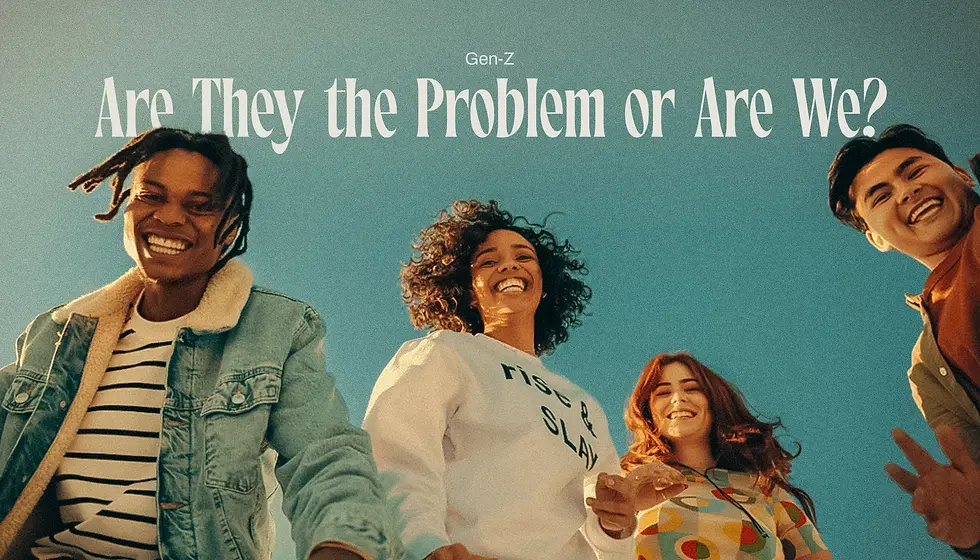Gen-Z and Work: Are They the Problem—Or Are We?
- Design Distrikt
- Mar 26, 2025
- 4 min read
I keep hearing people say Gen-Z is “lazy”, “entitled”, or “disloyal”. Initially I was like, yes it’s so true and it’s annoying. Why aren’t they like us? Why don’t they approach work the way we did?

But then I thought—we’re not like our parents either. And they weren’t like their parents before them.
That’s when I started looking at this on a broader perspective: Gen-Z isn’t working differently by accident. They’re working differently because of the world we built.
Every generation’s approach to work is shaped by what came before it. The things we fought for—better work-life balance, remote work, mental health awareness—are now their starting point.
So instead of asking why they aren’t like us, maybe we should be asking: What kind of workplace did we create for them?
How Work Has Changed Across Generations?
For our grandparents, survival was the Goal Farming, mining, factories—long hours, low pay, physically demanding jobs. Education was limited, job security was weak. They worked to put food on the table, period.
For our Parents’, Stability Was Everything They stayed in the same job for decades. Unions fought for better wages, and higher education was the golden ticket. The mantra was: "Work hard, stay loyal, retire with a pension."
My Generation, we are the Bridge Between Two Worlds We saw things shift—dial-up to smartphones, 9-to-5 to remote work. We value job satisfaction, flexibility, and work-life balance but still inherited that "loyalty" mindset.
Gen-Z: The Workforce We Didn’t See Coming They’re trying to redefine work on their terms. They’re not lazy—they just see work differently. And honestly? They might have some valid points.
Why Gen-Z is Quitting (And Why It’s Not All That Bad)
#QuitTok has over 40.4 million views (2023). Gen-Z isn’t quitting because they’re just entitled—they’re quitting because they value balance, growth, and purpose over toxic work cultures.
What’s Driving the Trend?
They Want Balance, Not Burnout: They watched their parents grind through recessions and pandemic. Life’s too short for a job that doesn’t respect their time.
They’re Ambitious, But on Their Terms: 20% of Gen-Z are investing in self-improvement through courses (McKinsey, 2023). They want to grow but in environments that align with their values.
They Have Options (And They Know It): By 2025, the global workforce is expected to grow by 12% (World Economic Forum). Gen-Z knows they don’t have to settle.
The Challenge for Employers
A manager I know shared a story about a Gen-Z employee who had morning classes and could only come in an hour or two late. Eventually, the commute and workload became too stressful, and she left.
The manager was frustrated—but it made me think:
Are we failing to adapt to their needs, or are they failing to adapt to the real world?
The Frustrating Side of Gen-Z
Let’s be real—Gen-Z can be ridiculous
The “Quit First, Ask Later” Mentality Employees quitting by 3 - 5 months of joining. Frustrating? Yes. But she left because she felt undervalued. Could she have spoken up first? Maybe.
The Comfort Zone Trap Remote work gives freedom, but some forget that mentorship and value of in-person collaboration still matter
The Loyalty Gap Job-hopping is at an all-time high (134% higher than in 2019). They move fast, chasing growth, better titles, and sometimes just a better vibe.
But here’s the thing: they’re not entirely wrong. They’re just different. And if we can understand them—both their strengths and their quirks—we could turn their behavior into an advantage.
How could we Adapt? (Without Losing Your Mind)
Train Them Well Enough to Leave, Treat Them Well Enough to Stay: But what if they still leave for a higher paycheck, and you can’t afford to match it? Either they valued money over everything or we couldn’t justify the financial gap. Then we should focus on making growth the biggest incentive, be upfront about future raises and make work place fulfilling enough that money isn’t the only factor. At the end of the day, you can’t win them all.
Set Clear Expectations: They need to understand the balance between flexibility and responsibility. Taking up responsibility is hard, and many are still "figuring themselves out." But that doesn’t mean accountability should take a backseat. Giver ownership early, create clear expectations and check for alignment (maybe they don’t and need a direction) give them the space to step up—but not carry them if they don’t.
Leverage Their Strengths: They’re tech-savvy, innovative, and value authenticity. Instead of resisting their approach, use it to drive your organisation forward.

The Big Question: Stick to Safe Ground or Push the Limit?
It’s tricky. Playing it too safe means stagnation. Pushing too hard risks burnout or losing people.
How do we find a middle ground?
Give ambitious goals, but provide support along the way.
Push those who want it. Not everyone thrives under pressure. Identify who’s ready for more and who needs stability.
Make risk-taking okay. If people are afraid of failing, they’ll stick to the safe path.
Growth happens outside comfort zones, but not in chaos. Find that balance, and you’ll build a team that thrives.
Work culture is evolving, and the next generation will be even more digital, demanding, and unpredictable.
So, are we adapting fast enough?

The Bottom Line
Gen-Z isn’t perfect, but neither were we. While they might test our patience, they’re also pushing us to rethink how we work, lead, and grow.
Instead of blaming, let’s start adapting. Because I feel the future of work isn’t about company loyalty anymore—it’s about loyalty to growth, balance, and purpose.
What’s your take?
#genz #futureofwork #worklifebalance #leadership #employeeretention #quittok #workculture #careergrowth #millennials #adaptability
Comments